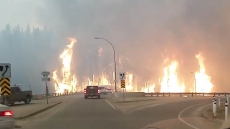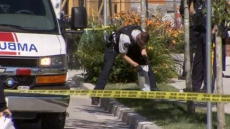KAMLOOPS, B.C. — Wildfires are continuing to tear through British Columbia one month after the provincial government declared a state of emergency.
Chief fire information officer Kevin Skrepnek said the province has seen 904 fires since April 1 and most of the major blazes wreaking havoc are ones that prompted the state of emergency declaration July 7.
"We have a lot of people out there doing everything they can to contain fires, to keep people out of harm's ways," he said. "This is a natural disaster and unfortunately it's going to be natural factors that are going to decide when a lot of these fires start to really calm down."
The continuing risk to people and property prompted the Cariboo Regional District to expand an evacuation order on Monday for areas in the West Chilcotin to include Satah Mountain and the P-Road area. This order expands on one issued for the region on July 28.
The district says due to "immediate danger to life safety due to fire," members of the RCMP or other groups will enforce the order.
The CRD also issued an adjacent evacuation alert for the Chantslar Forest Service Road area.
Dry conditions are forecast in the coming days, but Skrepnek said inflow winds from the ocean should finally clear smoky air from the south coast ahead of next weekend.

There is a chance a low pressure system will roll in next week bringing cooler temperatures and some rain, although the change could also cause fire-fuelling winds, Skrepnek said.
Among the month-long lasting fires includes the massive 1,100-square-kilometre Elephant Hill blaze near Ashcroft, B.C., which is believed to be human caused and remains under investigation.
Lands destroyed by a secondary fire that was accidentally ignited by crews responding that blaze last week prompted ranchers in the region to demand compensation in a public statement.
The statement issued Sunday by local ranchers said one of them remains uncertain how many of his 100 cows were killed in the blaze near Clinton, B.C., which was started by embers blown over a highway from a controlled burn.
"I'm numb, I just can't get my head around it," Greg Nyman said in the statement. "Most of my cows are either burnt up or going to die from their injuries."

Nyman said he doesn't blame crews on the front lines of the fires, but management for making the call to start the burn.
Ranchers and rural residents say they want to see an apology from government officials for the failed controlled burn and compensation for any livestock killed and rural property damaged as a result of fires.
Skrepnek has previously said wildfires of such large scale can't be fought with just water and retardants, and planned ignitions are necessary to get rid of fuels that allow fires to spread.
On Monday, Skrepnek said the BC Wildfire Service has been in touch with the ranchers and there is a mechanism within the Wildfire Act to entitles people to compensation.
Firefighting remains the priority, but Robert Turner of Emergency Management BC said a program to rebuild damaged fences is already underway and a commercial livestock relocation program is available to those who need to temporarily move animals away from affected areas.

"There's a lot of work been going on to support agriculture generally and ranchers particularly," he said.
Nyman said in an interview Monday that he received an email from the province, but is still waiting on a response from ministers at the provincial and federal levels to address the issue.
"We'd like to see an immediate response and just to be reassured that we're not going to be left by the side, that they're going to stand up and do what's right and help us all get back on our feet," he said.



